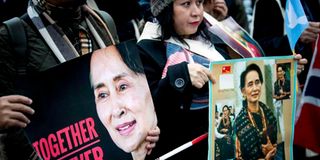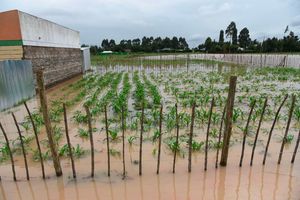ICJ rules in favour of Gambia on Myanmar genocide case

Protesters in support of Myanmar's State Counsellor Aung San Suu Kyi hold pictures in front of the Peace Palace of The Hague on December 11, 2019, following Aung San Suu Kyi's second day of hearing on the Rohingya genocide case.
The International Court of Justice (ICJ) has the jurisdiction to hear an application by The Gambia against Myanmar, the court announced following Myanmar’s application challenging its jurisdiction and the admissibility of the application.
The Gambia accuses Myanmar of committing genocide against its minority Rohingya population.
Judges at The Hague based UN court announced their decision on Friday on the case filed by The Gambia in November 2019, with the backing of the Organisation of Islamic Cooperation (OIC).
In a 35-page application, the West African nation accused Myanmar of persecuting the Rohingyas under the Convention on the Prevention and Punishment of the Crime of Genocide.
The Myanmar government is alleged to have connived with extremist Buddhist monks to embark on ethnic cleansing and genocide against the Rohingya who predominantly live in its Rakhine State.
Myanmar’s appeal was based on four preliminary objections.
It argued in its first objection that that the Court lacked jurisdiction, or alternatively that the application was inadmissible because the “real applicant” in the case was the OIC.
Myanmar also objected to the inadmissibility of the application on the basis that Gambia lacked standing to bring the case on. It said in its third objection that Gambia could not validly seise the Court in light of Myanmar’s reservation to Article VIII of the Genocide Convention.
In its fourth preliminary objection, Myanmar contended that there was no dispute between the parties under the Genocide Convention on the date on which the application was filed.
“The Court finds that it has jurisdiction, on the basis of Article IX of the Convention on the Prevention and Punishment of the Crime of Genocide, to entertain the Application filed by the Republic of The Gambia […] and that the application is admissible,” a statement from the court announcing the ruling states.
The ICJ, which is the principal judicial organ of the United Nations, is a civil court that hears disputes between countries. It also gives advisory opinions on legal questions referred to it by duly authorized United Nations organs and agencies of the system.
According to its statutes, judgment of the ICJ is final and cannot be appealed against. This means that the case against Myanmar will proceed.
The ICJ, which sits at the Peace Palace in The Hague in Netherlands, composes of 15 judges, elected for a nine-year term by the UN General Assembly and Security Council.
In Friday’s ruling, all 15 judges voted unanimously to reject three of the four objections presented by Myanmar.
There was one dissenting vote on the second preliminary objection, which cites Gambia’s lack of standing to bring the case to the court.
The dissenting judge, Xue Hanqin, a Chinese jurist, also voted against the final decision confirming the jurisdiction of the court and the admissibility of the application.
The alleged genocide was committed as part of a protracted conflict in the northern part of Myanmar's Rakhine state which had been characterised by sectarian violence between the Rohingya Muslim and Rakhine Buddhist communities.
Reports indicate recurrent military crackdown on Rohingya civilians by Myanmar's security forces, and militant attacks by Rohingya insurgents.
The conflict stems from the World War II, when Rohingya Muslims, who were allied with the British and promised a Muslim state in return, fought against local Rakhine Buddhists, who were allied with the Japanese.
But after the war, the resulting predominant Buddhist nation denied the Rohingyas citizenship status. To this day the Myanmar government considers them as foreigners from neighboring Bagladesh.
In 2017, hundreds of thousands of Rohingya civilians were forced to flee the country after a crackdown by the Myanmar security forces, according to reports. One Reuters report put the number of those who fled at about 700, 000.
Many of them ended up across the border in Bangladesh.
The situation has attracted wide condemnation from international rights groups and individuals.
The late South African anti-apartheid hero, Desmond Tutu, was among people who termed it as apartheid.
Both the US and UK governments have recognized the clampdown of the Rohingyas as genocide.
The Gambia, a predominantly Muslim country and mainland Africa’s smallest nation, was praised by the Islamic world for its stance against Myanmar.





